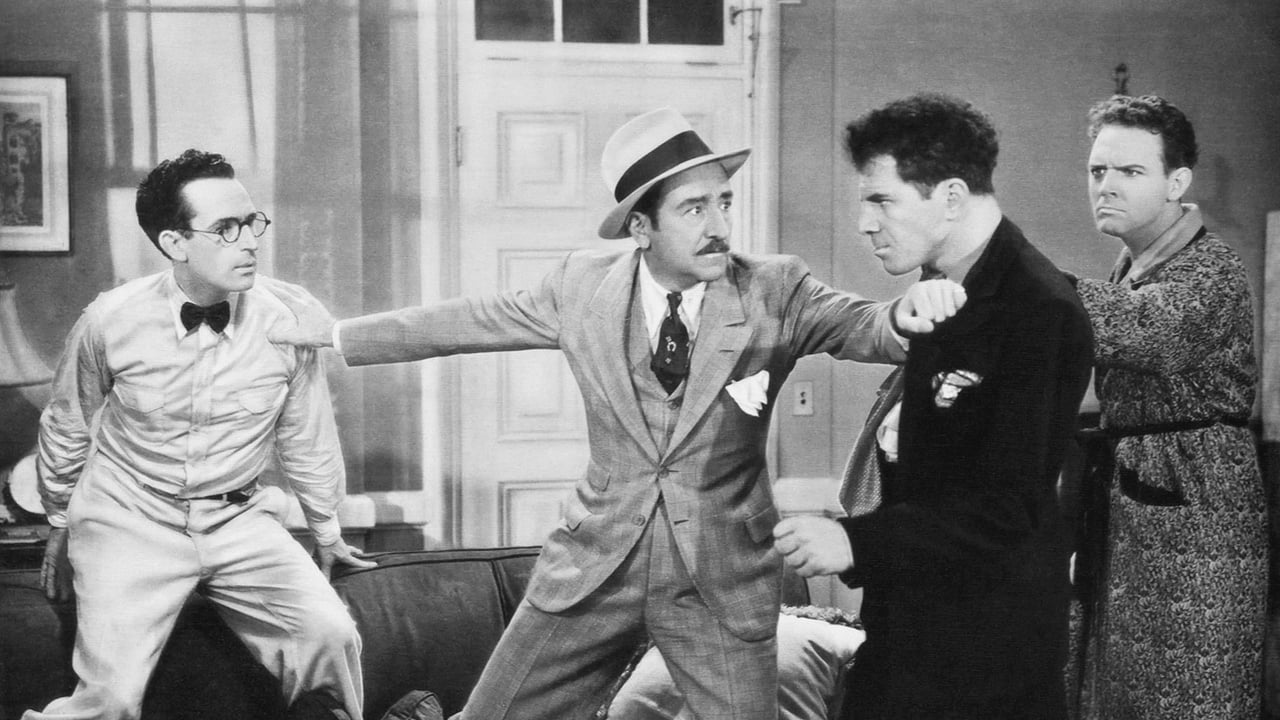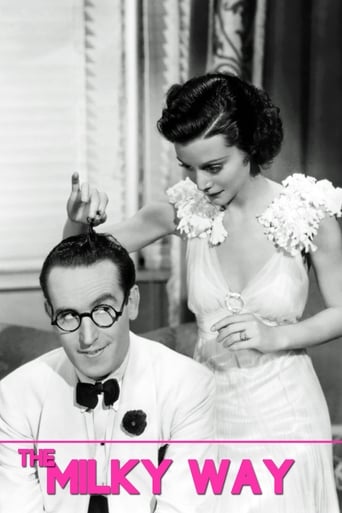

This is a small, humorous movie in some ways, but it has a huge heart. What a nice experience.
... View MoreThe best films of this genre always show a path and provide a takeaway for being a better person.
... View MoreThe movie's not perfect, but it sticks the landing of its message. It was engaging - thrilling at times - and I personally thought it was a great time.
... View MoreIt really made me laugh, but for some moments I was tearing up because I could relate so much.
... View MoreHarold Lloyd's talking films were a mixed bag, lacking the visual thrills of his "Safety Last" type comedy where dangerous situations got laughs out of amazing photography and choreography. Fans of his silents will be disappointed by the lack of this style, because now with a voice, he was like everybody else struggling for laughs in talkie comedy. His early talkies were filled with a few of the qualities of his silents, but by the end of the 1930's came around, he seemed to loose heart even though his films were still above average in the comedy genre.Taking the legend of Harold Lloyd, the silent star, out of the train of thought, "The Milky Way" is still a good film, with some funny moments and certainly filled with a fantastically huge supporting cast and excellent direction. Leo McCarey, one of the finest writers and directors of the 1930's, had a semi classic with thus that does not deserve to be so easily dismissed.The story has Lloyd as a well spoken and friendly milkman who ends up in the fight game when he comes to the rescue of his sister (Helen Mack), beating up professional fighter Lionel Stander and ending up coached by Stander's manager (Adolph Menjou) to become the country's latest champ. Seductive Verree Teasdale takes classical music to train him, while Lloyd has a funny scene showing society matron Marjorie Gateson how to block hits, then later imitates a naying pony. This isn't all laughs, though, with Lloyd concerned about the horse that pulled his milk truck. Still, it's pretty good as a whole, but it is necessary to look at Lloyd in a different light when viewing this and his other talkies.
... View MoreMild-mannered milk truck driver Harold Lloyd (as Burleigh "Tiger" Sullivan) defends his sister against a drunken middleweight boxing champion, then is mistaken for a fighter. He can't really box, of course, but manager Adolphe Menjou (as Gabby Sloan) makes Mr. Lloyd a famous fighter by fixing fights. "The Milky Way" is neither the best nor the worst of Lloyd's talking pictures. He is given an able director, adequate vehicle, and an extended "comic" support. With his distinctive voice, Lionel Stander (as "Spider" Schultz) makes a strong impression. Some of former box office champion Lloyd's best material involved special effects, and he still looks magical performing "hat tricks" herein. Nevertheless, it's obviously not working as well as Lloyd's classic silent features.***** The Milky Way (2/7/36) Leo McCarey ~ Harold Lloyd, Adolphe Menjou, Lionel Stander, Verree Teasdale
... View MoreIn this very solid Harold Lloyd screwball comedy, Lloyd plays an unassuming milk delivery man who finds himself on the front pages when he's credited with knocking out the world middle-weight boxing champion, Speed McFarland, in a street brawl. The negative publicity this news generates for McFarland comes much to the dismay of McFarland's manager, the slick Adolphe Menjou, who instantly plans a damage-control scheme. Lloyd will go up against a number of other boxers and win in fixed fights, building anticipation for a rematch against McFarland, in which McFarland will clobber him in the first round, since Lloyd doesn't really know how to fight. Of course, nothing plays out as simply as it should, and all manner of hijinks and supporting characters find themselves mixed up in this zany plot.I was impressed by the tight screenplay for "The Milky Way." It's classic 30s screwball, which means the script doesn't have to make a lot of sense, but even so the scriptwriters flesh out little details in the action -- like a thug who can't read, or Lloyd's affection for his milk cart horse, Agnes -- that play a role later in the plot. And the film is filled with all manner of sight gags and one-liners. Some of my favorite set pieces are the ones in which Menjou's sardonic girlfriend, played like a champ by Verree Teasdale, an actress I've never heard of, teaches Lloyd how to box by turning his training into a dance lesson; and a hilarious bit that finds Lloyd racing to his big match with McFarland while lugging around a colt, offspring of the beloved Agnes. Director Leo McCarey knows how to stage physical comedy, and the frame at any given time is stuffed with all manner of characters doing or saying something completely separate from what everybody else is doing or saying, so that the reigning visual style of the film is controlled chaos."The Milky Way" may not be in the same league as some of its screwball contemporaries, like "My Man Godfrey" or "Bringing Up Baby," but I guarantee it will put a smile on your face.Grade: B+
... View MoreThis is one of two latter-day Harold Lloyd vehicles directed by award-winning comedy experts - the other being his swansong, THE SIN OF HAROLD DIDDLEBOCK (1947), written and directed by Preston Sturges (with which I hope to re-acquaint myself later on in the month via a Cable TV recording, in direct anticipation of 3 more of Sturges' own films I own on DVD).I've watched all but a couple of Lloyd's Talkies (WELCOME DANGER [1929] and PROFESSOR BEWARE [1938]): while his transition to the new medium was certainly not as disastrous as Buster Keaton's, I still feel that Lloyd's brand of comedy wasn't particularly suited to Sound; as a matter of fact, the film depends a good deal on dialogue for laughs - and most of the best lines are not even delivered by the star! McCarey himself (reportedly, he fell ill during production of THE MILKY WAY and some scenes were actually directed by Norman Z. McLeod) had been a practitioner of Silent comedies for Laurel & Hardy but, when Sound came in, proceeded to work with practically all the major Talkie star comedians - Eddie Cantor, The Marx Bros., W.C. Fields, Mae West, and even Cary Grant. In any case, the milkman-turned-boxer plot line provides plenty of uproarious situations - and it was eventually revamped as a musical vehicle for Danny Kaye called THE KID FROM BROOKLYN (1946; I watched this as a kid and, if I have the time, I may check it out again as well) which, incidentally, was directed by Norman Z. McLeod!Still, like I said, Lloyd is somewhat upstaged by his fellow actors in this one: Adolphe Menjou as the smart boxing manager (of two rival prizefighters!) and Lionel Stander as his burly but dim-witted hood/assistant; but the women are strong characters as well, particularly Verree Teasdale as Menjou's cynical girl (incidentally, the couple were married in real-life!) and Helen Mack as Lloyd's brave but apprehensive younger sister (conveniently engaged off by Menjou to the current boxing champ - whom Lloyd had ostensibly knocked out in a fit of rage and who would like to get his prestige back). The ending, however, is a bit abrupt - especially since the women (including Lloyd's love interest, played by Dorothy Wilson) are kind of neglected...as is a newborn pony which has followed Lloyd into the boxing arena! Unfortunately, I experienced some freezing issues around the 27-minute mark but, when I played the scene back, the glitch was thankfully not repeated.P.S. According to the IMDb, there are at least 11 movies made between 1917 and 2006 entitled THE MILKY WAY but, apart from the Lloyd/McCarey picture, the most notable are certainly the Oscar-winning 1940 animated short and Luis Bunuel's wickedly funny 1969 treatise on Catholic dogma.
... View More